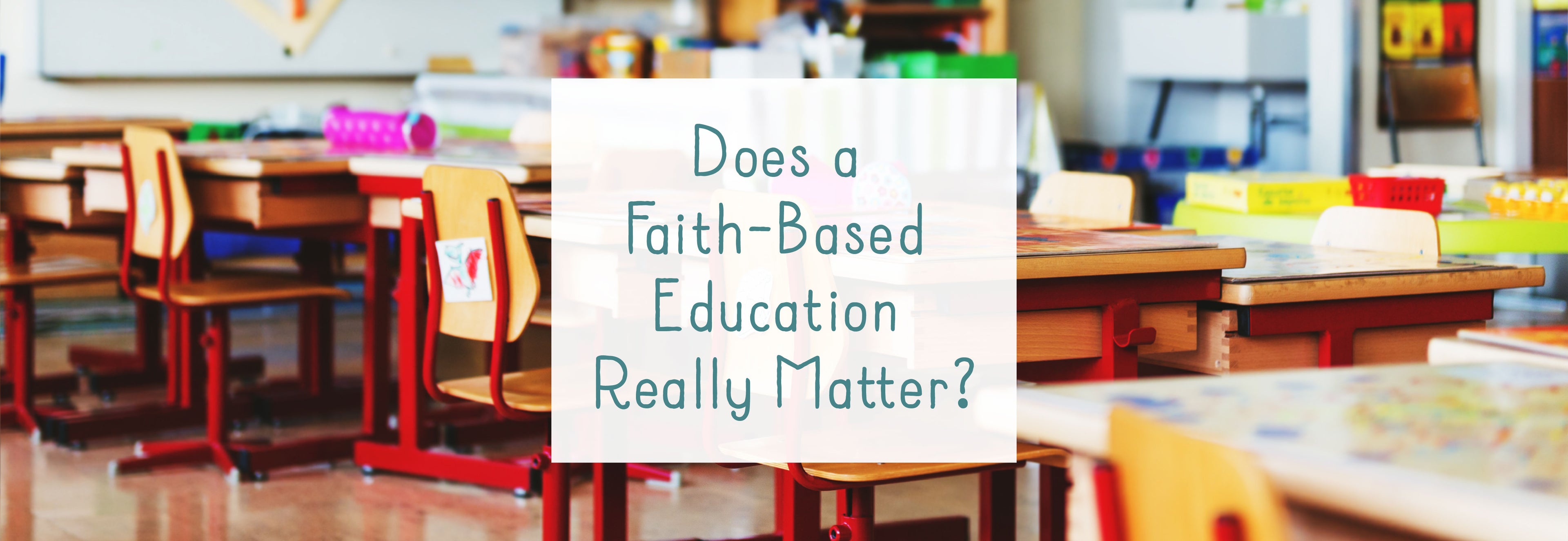
Does faith-based education really matter or make a difference? In this blog post and video, Jenny Phillips answers these questions and more. She shares how a faith-based education completely and foundationally changed her family and how it can change yours!
Why did you choose to homeschool?
I’m often asked why I choose to homeschool. There are actually many reasons I homeschool, such as creating stronger family relationships and having time for things we choose. But one of the biggest reasons I homeschool is to give my children a faith-based education that emphasizes morals and values.
Does faith-based education really matter or make a difference?
Before I decided to homeschool my children, I understood that God and faith and Christianity and prayer were not a part of public education, but I didn’t think it mattered because our children were taught spiritual things outside of school. We had daily scripture study with our family. We attended church every week. We talked often to our kids about our Savior, Jesus Christ, and His teachings. But I have found that for many children, including mine, those things are not enough to counteract some of the subtle and powerful and consistent negative influences of an education stripped of faith in God. I discovered that a faith-based education completely and foundationally changed our family and I think it can change yours!
I think as parents, we have lost sight of what an education is. We view school as a drop-off and pick-up, often not truly knowing what is going on, what is being read, and trusting, almost blindly, a faithless education to shape our children’s minds. An education is not just something that provides academic instruction. An education fundamentally and inescapably molds the hearts and minds of children, impacting their lifeview, their morals, their confidence, their desire to seek after good things in life, and the things that matter most to them.
Also, it’s important to remember that ideal governments are not established to choose and dictate for parents what and how their children are taught. Governments are established to protect our right to educate our children in a way that aligns with our religious beliefs and values. The responsibility of choosing how and what a child is taught rests squarely on the shoulders of parents. Noah Webster wrote: “To educate children well is one of the most important duties of parents.”
And education has to have either a religious or secular humanistic foundation.
What is secular humanism?
Would you be surprised to know that public schools in the United States are based on an underlying lifeview and philosophy? It’s called secular humanism, which is defined as “belief that humanity is capable of morality and self-fulfillment without belief in God.” Whether we recognize it or not, the backbone of public schools is the belief system of secular humanism.
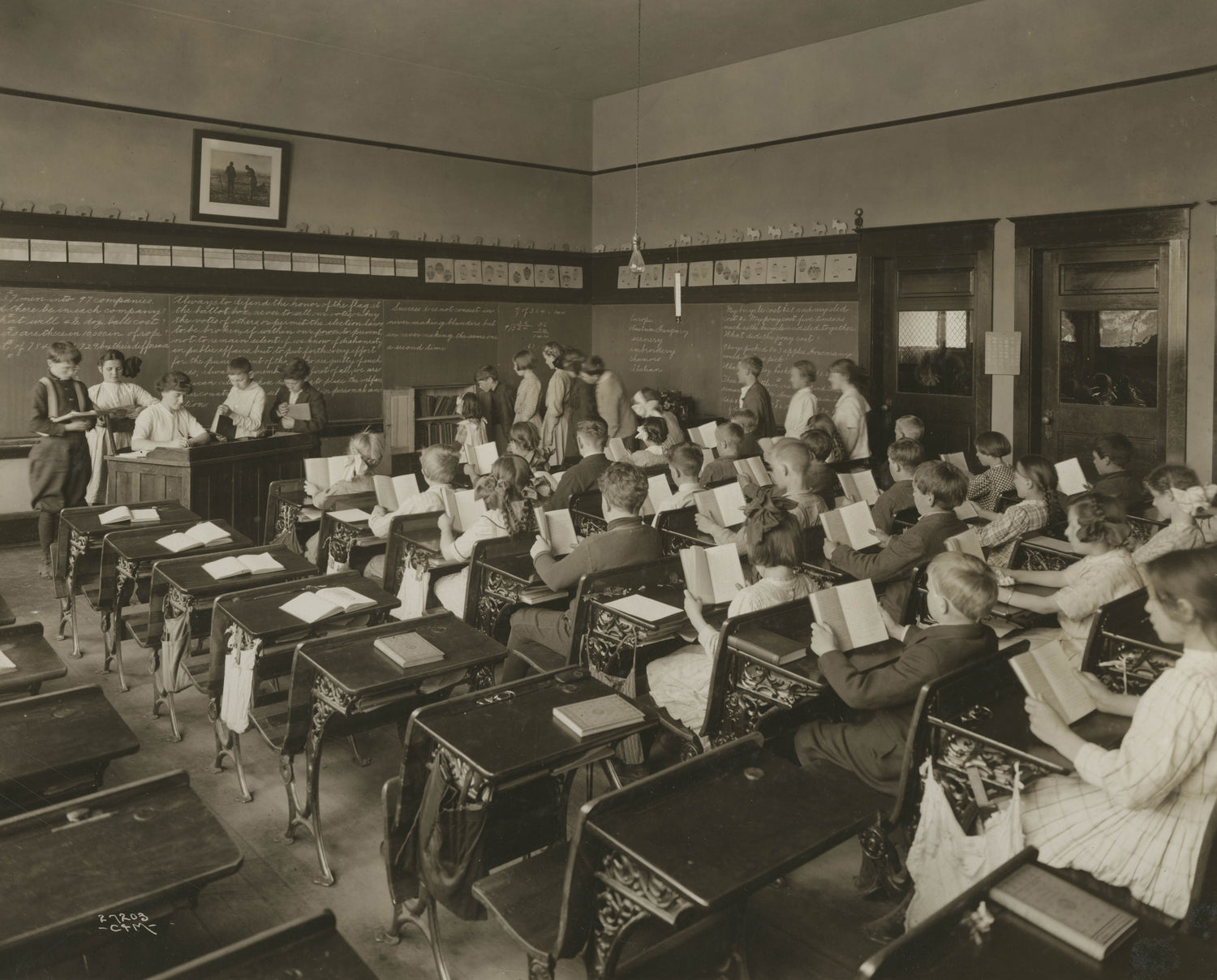
Before I continue, I want to note how grateful I am for the amazing public school teachers and administrators who are working so hard, many of whom are faithful followers of Christ, to do so much good in their classrooms and schools within the constraints they face. I believe they are true heroes and are needed in our world. The education system they teach in now is vastly different than it once was.
It’s interesting to note that in early America, you could hardly find a school that wasn’t Christian-based with the Bible as the main textbook.
Also, this is fascinating: Entrance to Harvard in the beginning required strong knowledge of the Bible.
Things have really changed.
It’s men like John Dewey, called “The Father of Modern Education,” and other humanists and atheists who fought hard to bring in the idea that religion did not help but hindered schools. John Dewey, whose ideas now permeate public education, had the goal to take God and religion out of academics. He and other humanists have been very successful with their goals, and most people don’t even realize it.
Most parents today were educated with secular humanistic philosophies themselves. By the country’s law, secular humanism is the system of thought that has laid the foundation of public schools since the 1960s.
Because almost all parents of school-aged children today have been educated through a humanistic approach, it definitely feels like the norm to people, even in my generation! But I have found that education based on and centered around God and His teachings has tremendous benefits that simply cannot be gained through a secular humanistic education.
When the spiritual side of things is taken out of learning, learning becomes disconnected, shallow, less important, and uninspiring, and many children tend to lose a true love and appreciation for learning.
Isn’t it enough to teach our children faith at home outside of their schooling?
I mentioned at the beginning that before I decided to homeschool my children, I understood that God and faith and Christianity and prayer were not a part of public education, but I didn’t think it mattered because our children were taught spiritual things outside of school.
But it wasn’t enough. I began to see in my children the impacts of a secular humanistic education, and I paid attention to the warning signs I saw. I pulled my children out of school, and it wasn’t until we were deep in homeschool that I started to see that not only can a secular humanistic approach to education be dangerous to a child’s faith and character, but this educational approach is empty and lacks depth.
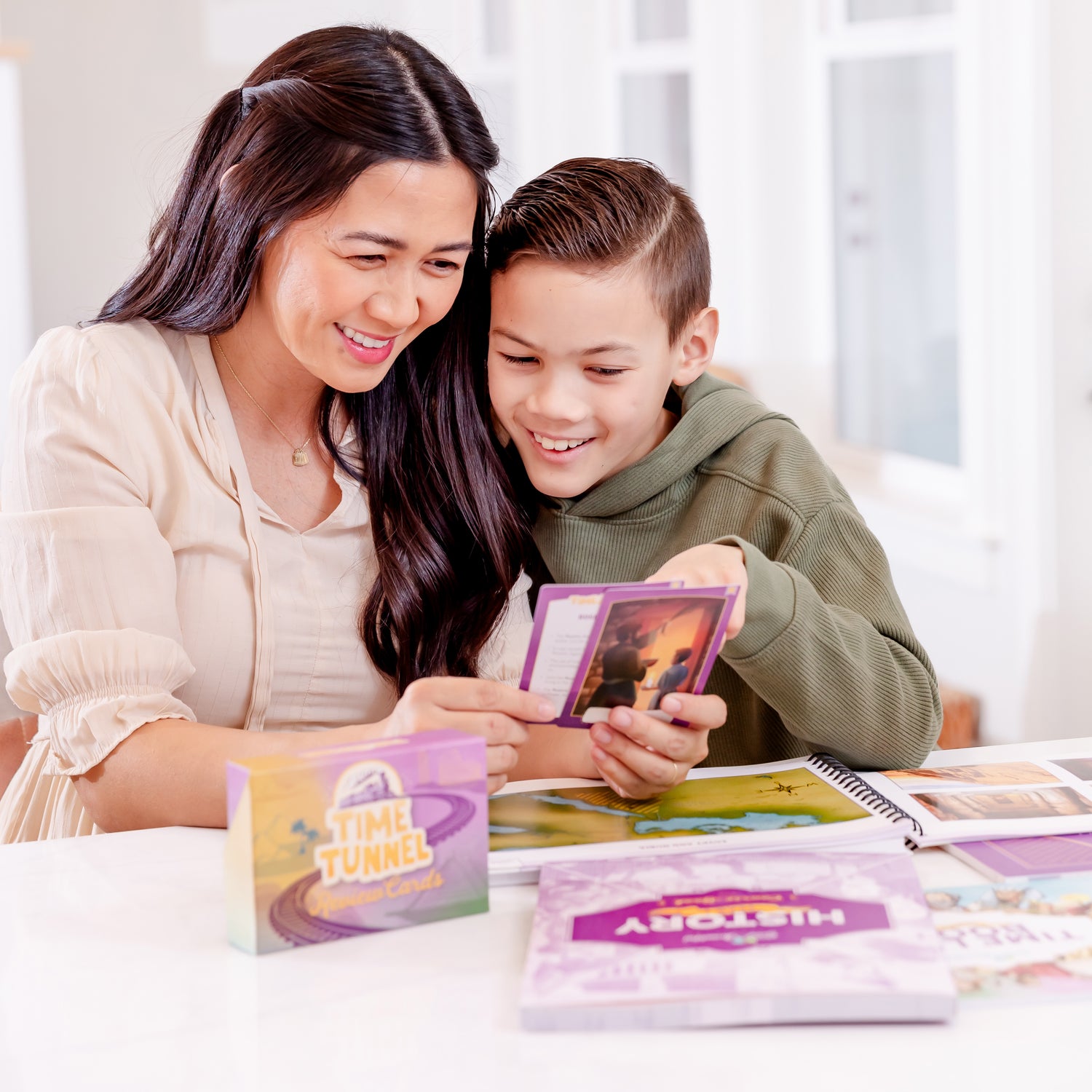
Through homeschooling my children the past 13 years or so, we have found incredible joy and blessings beyond what we could have ever guessed possible. We immersed ourselves in an education where God is the center of all things by using books and curriculum that are flooded with faith, focused on family, filled with light, abounding in meaning and depth, intentionally pure, and packed with beauty and wonder.
Homeschooling is one of the best decisions I’ve made!
Choosing to give my children a faith-based education through homeschooling is one of the best decisions I have ever made in my life and has borne such beautiful fruit that my children and I will enjoy forever.
The books my children read, the curriculum they use, the conversations and discussions that they have with me and with their friends at our Christian co-op are filled with God. He is not banned from their curriculum and their discussions and their education. He is not absent. He is not ignored or out of the picture. He is a real, living, beautiful, central part of my children’s education every day.
I believe our society has trained parents to think that because they don’t have an education degree or certificate, they don’t really know how to best educate their children, and they just need to turn them over to the government’s secular humanistic programs. But the truth is, we have a choice. Public school doesn’t have to be an automatic choice for you and your children. For many people, homeschooling offers a deep, meaningful, beautiful, and powerful education, based on and focused on the teachings of Jesus Christ.
Let us guard against being indifferent or unknowledgeable about the kind of religious and moral training our children are receiving through examples and philosophies in their learning materials, through the absence of God and faith, or through the behavior and influence of other students.
Is your children’s education giving them a safe, wholesome environment for their hearts and minds to grow in their goodness and faith in Jesus Christ? Are our children gaining more Christlike, noble character through their education? These are questions every parent should ask.
If you felt the truth in this message, I invite you to take action. What the action will be is up to you and how God guides you. Perhaps it will lead you to homeschool; or to send your child to a private Christian school; or to become more involved in your child’s public school by reviewing, understanding, and supplementing what is being taught and correcting any errors, by monitoring the books that are being read by your child, and by finding ways that you can bring the best of literature and ideas and a love of what is good and beautiful into your child’s life.
God cares deeply about our precious children, and as secular humanism boldly reaches out for our children, we can trust that God will show us how to combat it if we open our eyes and ask Him. We must simply follow where He leads. Charlotte Mason wrote: “To bring the human race, family by family, child by child, out of the savage and inhuman desolation where [God] is not, into the light and warmth and comfort of the presence of God, is, no doubt, the chief thing we have to do in the world.”

You may also like . . .
Related Posts
-

How Do You Celebrate the First Day of Homeschool
Homeschooling is a blessing in so many ways. The first day of homeschool each year is full of excitement—and maybe a little apprehension. In this blog post we’ve created a...
How Do You Celebrate the First Day of Homeschool
Homeschooling is a blessing in so many ways. The first day of homeschool each year is full of excitement—and maybe a little apprehension. In this blog post we’ve created a...
Read more How Do You Celebrate the First Day of Homeschool -

How to Know if Your Homeschooler Is Ready for S...
Many parents wonder, “How can I tell if my child is ready for self-directed work?” Here are some ways to tell if they’re ready, plus tips to help them prepare...
How to Know if Your Homeschooler Is Ready for S...
Many parents wonder, “How can I tell if my child is ready for self-directed work?” Here are some ways to tell if they’re ready, plus tips to help them prepare...
Read more How to Know if Your Homeschooler Is Ready for Self-Directed Work -
 58 comments
58 commentsGood and Beautiful Songs
The Good and Beautiful Songs page contains favorite hymns, Bible songs, nursery rhymes, learning songs, Christmas songs, and calming music. Watch the beautiful and engaging music videos, learn about the...
58 commentsGood and Beautiful Songs
The Good and Beautiful Songs page contains favorite hymns, Bible songs, nursery rhymes, learning songs, Christmas songs, and calming music. Watch the beautiful and engaging music videos, learn about the...
Read more Good and Beautiful Songs -
 111 comments
111 commentsYou Can Homeschool
Beginning homeschooling can feel overwhelming, but with The Good and the Beautiful, you can homeschool! In this video, Jenny Phillips shares how you can overcome some common limiting beliefs about...
111 commentsYou Can Homeschool
Beginning homeschooling can feel overwhelming, but with The Good and the Beautiful, you can homeschool! In this video, Jenny Phillips shares how you can overcome some common limiting beliefs about...
Read more You Can Homeschool -
 1 comment
1 commentAll Things Bright and Beautiful
Sing along with The Good and the Beautiful Kids Choir in this lovely arrangement of All Things Bright and Beautiful. From little flowers and singing birds to running rivers and...
1 commentAll Things Bright and Beautiful
Sing along with The Good and the Beautiful Kids Choir in this lovely arrangement of All Things Bright and Beautiful. From little flowers and singing birds to running rivers and...
Read more All Things Bright and Beautiful -
 11 comments
11 commentsThe Gift of Time Through Homeschooling
Homeschooling gives children and families the valuable gift of time. Jenny Phillips discusses how homeschooling allows children to grow at their own pace, develop and explore interests, and strengthen family...
11 commentsThe Gift of Time Through Homeschooling
Homeschooling gives children and families the valuable gift of time. Jenny Phillips discusses how homeschooling allows children to grow at their own pace, develop and explore interests, and strengthen family...
Read more The Gift of Time Through Homeschooling -
 1 comment
1 commentBattle Hymn of the Republic
His truth marches on in the bold lyrics of “Battle Hymn of the Republic.” This original arrangement from The Good and the Beautiful is performed by Life in 3D. Find...
1 commentBattle Hymn of the Republic
His truth marches on in the bold lyrics of “Battle Hymn of the Republic.” This original arrangement from The Good and the Beautiful is performed by Life in 3D. Find...
Read more Battle Hymn of the Republic -
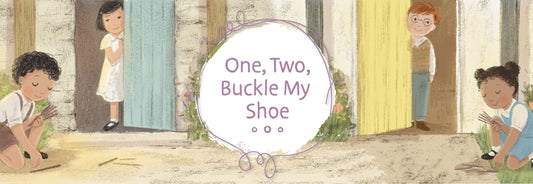
One, Two, Buckle My Shoe
Sing along with the classic rhyme “One, Two, Buckle My Shoe” in this beautifully illustrated video only from The Good and the Beautiful. Then print the lyrics and read about...
One, Two, Buckle My Shoe
Sing along with the classic rhyme “One, Two, Buckle My Shoe” in this beautifully illustrated video only from The Good and the Beautiful. Then print the lyrics and read about...
Read more One, Two, Buckle My Shoe -

There Is Sunshine in My Soul Today
See Jesus all around you in the hymn, “There Is Sunshine in My Soul.” Desi and Seli of Elenyi Music, accompanied by pianist Jamie Johnson, sing about the beauty of...
There Is Sunshine in My Soul Today
See Jesus all around you in the hymn, “There Is Sunshine in My Soul.” Desi and Seli of Elenyi Music, accompanied by pianist Jamie Johnson, sing about the beauty of...
Read more There Is Sunshine in My Soul Today -

Here We Go Round the Mulberry Bush
Help your preschooler develop good morning habits with the song “Here We Go Round the Mulberry Bush.” Watch and sing along with this adorable illustrated video to make getting ready...
Here We Go Round the Mulberry Bush
Help your preschooler develop good morning habits with the song “Here We Go Round the Mulberry Bush.” Watch and sing along with this adorable illustrated video to make getting ready...
Read more Here We Go Round the Mulberry Bush -
 2 comments
2 commentsHaving Homeschool Doubts?
As homeschool parents, we know how important our job is, and it's so common to worry that we will mess something up. Now that I have raised three of my...
2 commentsHaving Homeschool Doubts?
As homeschool parents, we know how important our job is, and it's so common to worry that we will mess something up. Now that I have raised three of my...
Read more Having Homeschool Doubts? -

God Moves in a Mysterious Way
God moves in our lives in mysterious ways. From storms at sea to the clouds overhead to the sweet flowers in the fields, He is with you. Print the lyrics...
God Moves in a Mysterious Way
God moves in our lives in mysterious ways. From storms at sea to the clouds overhead to the sweet flowers in the fields, He is with you. Print the lyrics...
Read more God Moves in a Mysterious Way -
 2 comments
2 commentsMaster, the Tempest Is Raging
When waves come crashing at your feet, calm your heart in the storms of life with the same words Jesus spoke to the raging sea: “Peace, be still.” Feel that...
2 commentsMaster, the Tempest Is Raging
When waves come crashing at your feet, calm your heart in the storms of life with the same words Jesus spoke to the raging sea: “Peace, be still.” Feel that...
Read more Master, the Tempest Is Raging -

Be Thou My Vision
Find hope in the lyrics of “Be Thou My Vision” sung by Josh Thorne, accompanied by harp and Irish whistle, and performed on the small island of Inisheer, Ireland. The...
Be Thou My Vision
Find hope in the lyrics of “Be Thou My Vision” sung by Josh Thorne, accompanied by harp and Irish whistle, and performed on the small island of Inisheer, Ireland. The...
Read more Be Thou My Vision -
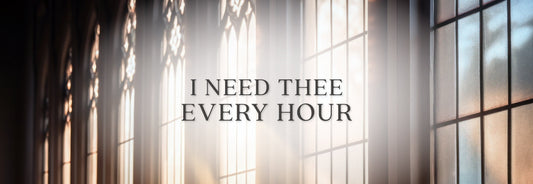 1 comment
1 commentI Need Thee Every Hour
Experience the timeless beauty of “I Need Thee Every Hour” in this heartfelt performance by Life in 3D, produced by The Good and the Beautiful. This soul-stirring arrangement brings a...
1 commentI Need Thee Every Hour
Experience the timeless beauty of “I Need Thee Every Hour” in this heartfelt performance by Life in 3D, produced by The Good and the Beautiful. This soul-stirring arrangement brings a...
Read more I Need Thee Every Hour -

Jesus, What a Friend in Sorrow
Find comfort in the hymn Jesus, What a Friend in Sorrow. Learn the story behind the song and print the lyrics.
Jesus, What a Friend in Sorrow
Find comfort in the hymn Jesus, What a Friend in Sorrow. Learn the story behind the song and print the lyrics.
Read more Jesus, What a Friend in Sorrow -
 3 comments
3 commentsAmazing Grace
"Amazing Grace" is not only one of the most recognizable Christian hymns, it is one of the most moving hymns as well. Sing along with this beautiful arrangement performed by...
3 commentsAmazing Grace
"Amazing Grace" is not only one of the most recognizable Christian hymns, it is one of the most moving hymns as well. Sing along with this beautiful arrangement performed by...
Read more Amazing Grace -
 1 comment
1 commentHow Homeschooling Can Heal Your Family
Jenny Phillips, the founder of The Good and the Beautiful, shares three profound ways homeschooling can build and strengthen family bonds in this encouraging video. As our society becomes more and...
1 commentHow Homeschooling Can Heal Your Family
Jenny Phillips, the founder of The Good and the Beautiful, shares three profound ways homeschooling can build and strengthen family bonds in this encouraging video. As our society becomes more and...
Read more How Homeschooling Can Heal Your Family -

What Child Is This? Lyrics
The Christmas hymn “What Child Is This?” tells of the humble birth of our Savior and the many visitors who came from near and far, bearing gifts for their King....
What Child Is This? Lyrics
The Christmas hymn “What Child Is This?” tells of the humble birth of our Savior and the many visitors who came from near and far, bearing gifts for their King....
Read more What Child Is This? Lyrics
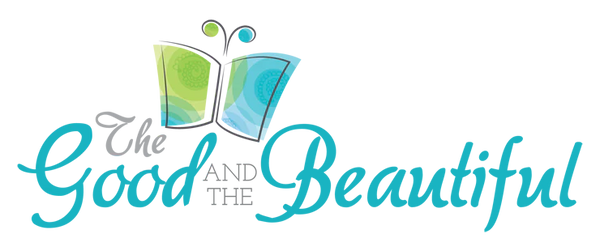
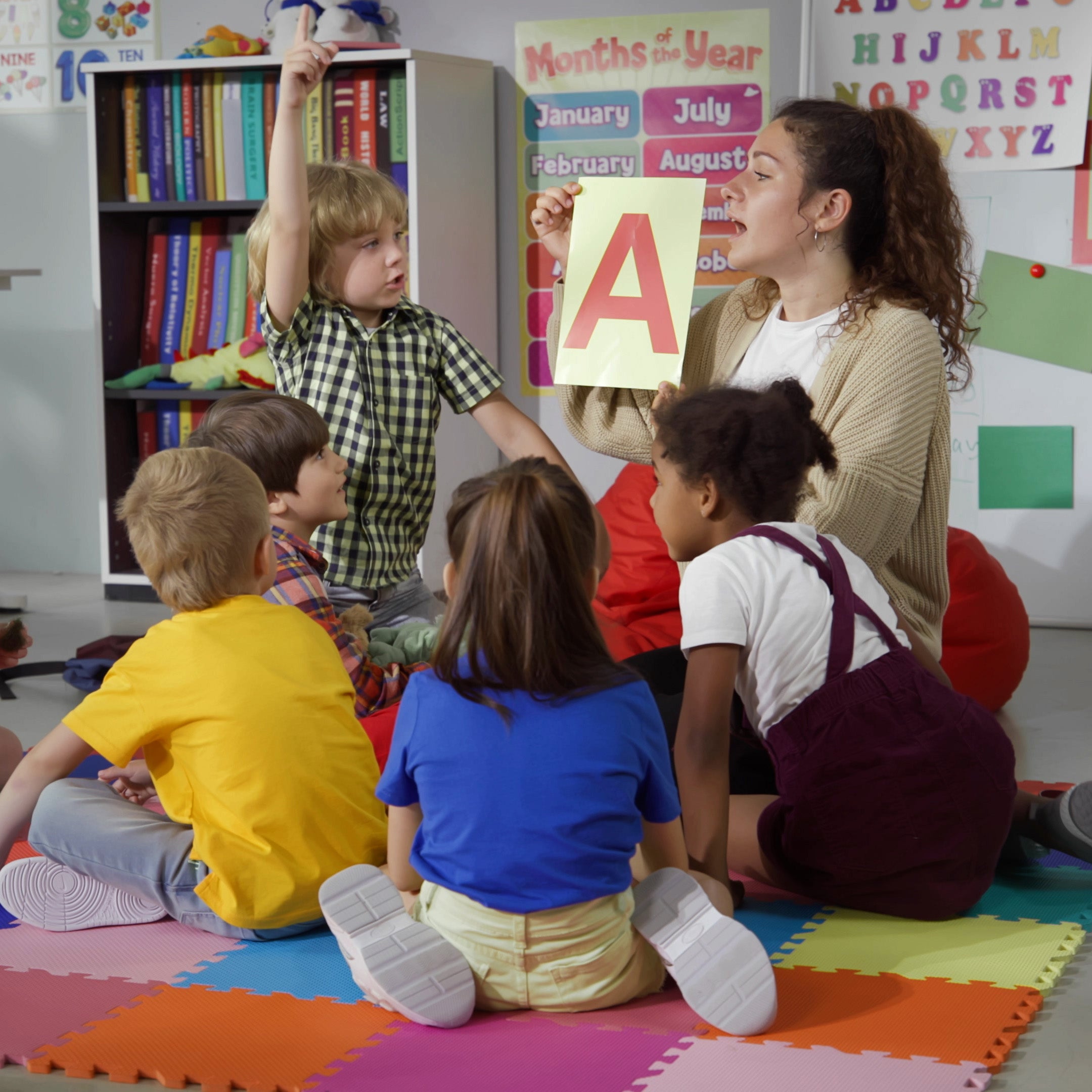



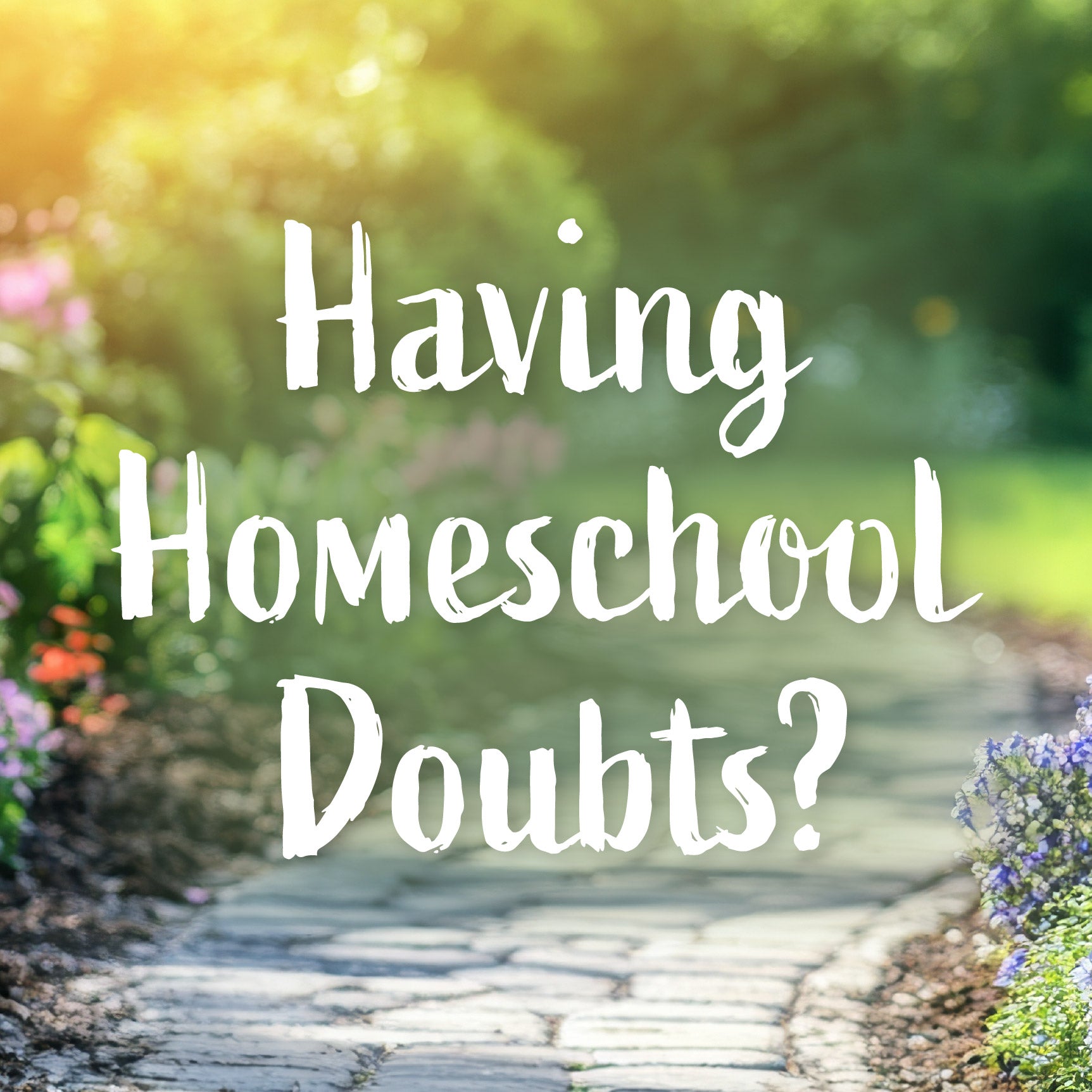
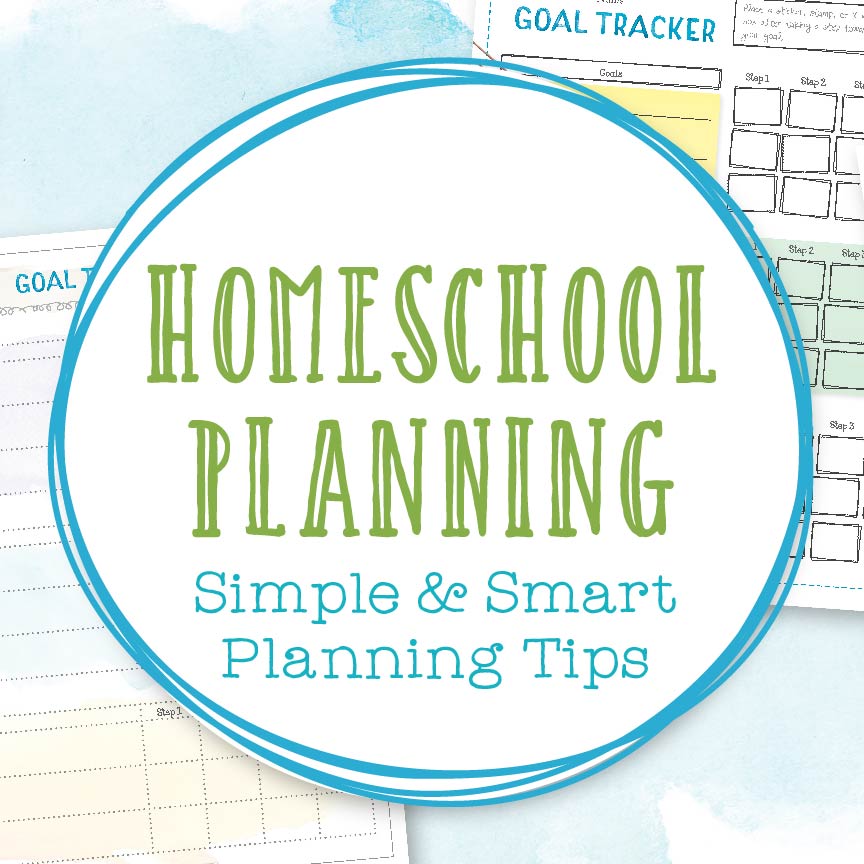
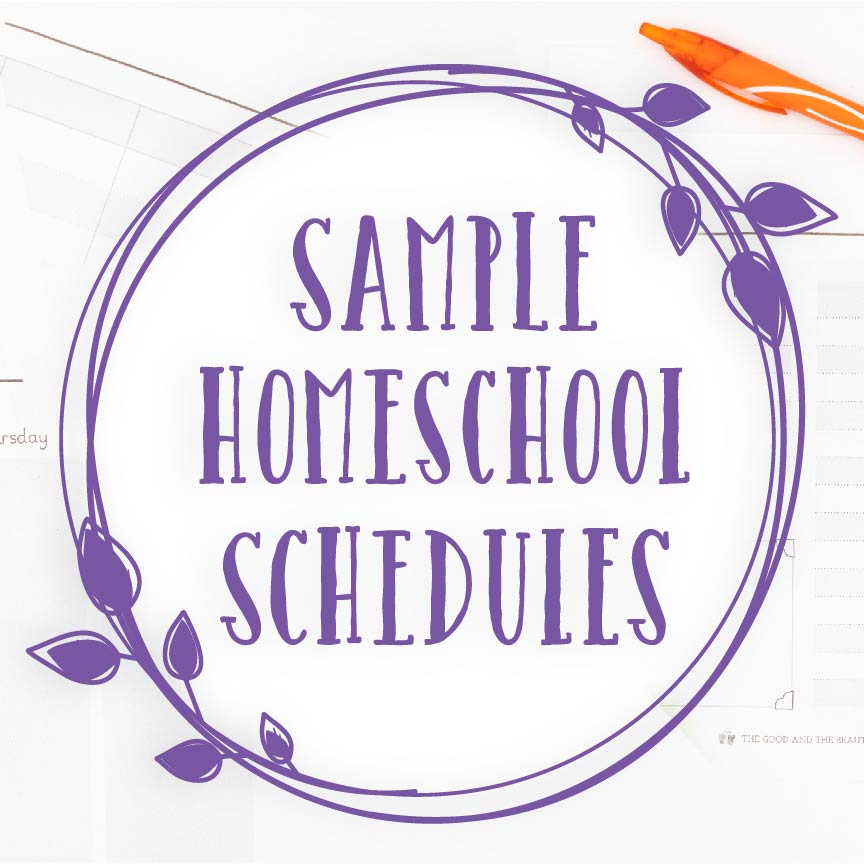



















24 comments
Having a faith based education is critical for anyone who wants their kids to stay solid in their faith after school. If kids aren’t being rooted and grounded in the truth, the moment they get to college or the workplace and are surrounded by evolutionists and atheists, they will start to flounder.
TGATB has been the perfect blend of curriculum and faith for our family! We love the spiral method and focus on God in the lessons. TGATB helps make homeschooling easy.
I love this post and the thought out perspective on faith based education. I loved watching the video associated with this from Jenny. Sharing her bright and bold testimony with the world. So many beautiful things shared. Thank you! 🩷
We love TGATB so much. We do it in conjunction with Classical Conversations. It ao beautiful encompasses so many of our loves including nature, poetry, and art. But most of all it include good godly character and Christian morals that I want so badly to teach my children. Thank you for this amazing curriculum!
I completely agree with all of this! Teaching our children the Bible and helping lead them in their walk with Christ is the most important thing we can do as parents. Then, showing them how God also fits into their education helps them grasp the truth of Him and this world. Our relationship with God is a huge reason why we homeschool.